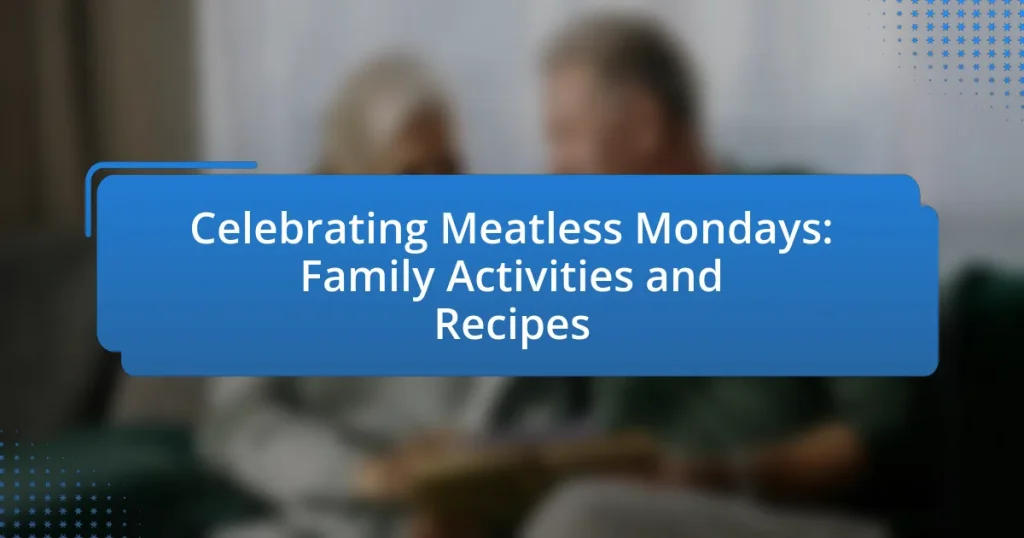Meatless Mondays is a global initiative encouraging individuals to refrain from consuming meat on Mondays to promote health and environmental sustainability. This article explores the benefits of participating in Meatless Mondays, including improved health outcomes, reduced greenhouse gas emissions, and the opportunity for families to bond through cooking and meal planning. It addresses common misconceptions about meatless diets, offers practical tips for meal preparation, and provides a variety of delicious plant-based recipes. Additionally, the article highlights engaging family activities that can enhance the Meatless Monday experience, making it enjoyable and educational for all members.

What is the concept of Meatless Mondays?
Meatless Mondays is a global campaign encouraging individuals to abstain from eating meat on Mondays to promote health and environmental sustainability. The initiative aims to reduce meat consumption, which is linked to various health issues and environmental concerns such as greenhouse gas emissions from livestock farming. Research indicates that reducing meat intake can lower the risk of chronic diseases and contribute to a more sustainable food system. The campaign has gained traction since its launch in 2003, supported by various organizations advocating for healthier diets and environmental awareness.
Why should families participate in Meatless Mondays?
Families should participate in Meatless Mondays to promote healthier eating habits and reduce environmental impact. By choosing plant-based meals once a week, families can lower their intake of saturated fats and cholesterol, which are often found in meat, leading to improved heart health. Additionally, studies indicate that reducing meat consumption can significantly decrease greenhouse gas emissions; for instance, the Food and Agriculture Organization reports that livestock production contributes to 14.5% of global greenhouse gas emissions. Therefore, participating in Meatless Mondays not only benefits individual health but also contributes to a more sustainable planet.
What are the health benefits of adopting a meatless diet?
Adopting a meatless diet offers numerous health benefits, including reduced risk of chronic diseases, improved heart health, and better weight management. Research indicates that individuals who follow plant-based diets have lower rates of heart disease, hypertension, and type 2 diabetes. A study published in the Journal of the American Heart Association found that a vegetarian diet is associated with a 32% lower risk of heart disease compared to non-vegetarians. Additionally, plant-based diets are typically lower in calories and saturated fats, which can aid in weight loss and maintenance. Furthermore, consuming a variety of fruits, vegetables, whole grains, and legumes enhances nutrient intake, providing essential vitamins, minerals, and antioxidants that support overall health.
How does participating in Meatless Mondays contribute to environmental sustainability?
Participating in Meatless Mondays contributes to environmental sustainability by reducing greenhouse gas emissions associated with meat production. The livestock sector is responsible for approximately 14.5% of global greenhouse gas emissions, primarily due to methane released from enteric fermentation and nitrous oxide from manure management. By choosing plant-based meals one day a week, individuals can significantly lower their carbon footprint, as plant-based foods generally require less energy, land, and water to produce compared to animal products. For instance, a study published in the journal “Nature” found that if everyone in the U.S. skipped meat and cheese just one day a week, it would be equivalent to taking 7.6 million cars off the road for a year. This demonstrates that even small dietary changes can lead to substantial environmental benefits.
What are some common misconceptions about Meatless Mondays?
Common misconceptions about Meatless Mondays include the belief that they are solely for vegetarians or vegans, that they lack nutritional value, and that they require extensive cooking skills. Many people think Meatless Mondays are only for those who do not eat meat regularly, but the initiative encourages everyone to reduce meat consumption for health and environmental benefits. Additionally, some believe that plant-based meals are inherently less nutritious; however, studies show that a well-planned meatless diet can provide all necessary nutrients. Lastly, the idea that preparing meatless meals is complicated is misleading, as there are numerous simple and quick recipes available that make it easy for families to participate.
Is a meatless diet lacking in essential nutrients?
A meatless diet is not inherently lacking in essential nutrients. Many individuals following a vegetarian or vegan diet can obtain all necessary nutrients through careful planning and food choices. For instance, plant-based sources such as legumes, nuts, seeds, whole grains, and fortified foods can provide adequate protein, iron, calcium, and vitamin B12. Research published in the Journal of the American Dietetic Association indicates that well-planned vegetarian diets can meet nutritional needs and may offer health benefits, including lower risks of chronic diseases.
Can Meatless Mondays be enjoyable for picky eaters?
Meatless Mondays can be enjoyable for picky eaters by offering a variety of flavorful and appealing plant-based dishes. Many recipes can be tailored to suit individual preferences, such as incorporating familiar ingredients or flavors that picky eaters already enjoy. For instance, using pasta, rice, or familiar sauces can make vegetable-based meals more acceptable. Additionally, studies show that introducing new foods alongside familiar favorites can increase acceptance, making it easier for picky eaters to try meatless options.

How can families celebrate Meatless Mondays together?
Families can celebrate Meatless Mondays together by planning and preparing plant-based meals as a unit. Engaging in meal planning allows family members to choose recipes that interest them, fostering collaboration and creativity. Cooking together not only enhances bonding but also educates family members about nutrition and the benefits of a meatless diet, such as reduced environmental impact and improved health. Research indicates that families who cook together are more likely to eat healthier meals and develop better eating habits.
What family activities can enhance the Meatless Monday experience?
Engaging in cooking together as a family can significantly enhance the Meatless Monday experience. This activity fosters teamwork and creativity, allowing family members to collaborate on meal preparation, explore new vegetarian recipes, and learn about plant-based nutrition. Research indicates that cooking together can improve family bonding and communication, making mealtime more enjoyable and educational. Additionally, families can organize a weekly meal planning session, where they discuss and select meatless recipes, ensuring everyone has a voice in the process and increasing excitement for the meals ahead.
How can cooking together foster family bonding on Meatless Mondays?
Cooking together on Meatless Mondays fosters family bonding by creating a shared experience that encourages communication and collaboration. Engaging in meal preparation allows family members to work as a team, enhancing their relationships through joint decision-making about recipes and ingredients. Research indicates that families who cook together report stronger connections and improved communication skills, as they share stories and experiences while preparing meals. This collaborative effort not only promotes healthier eating habits but also instills a sense of accomplishment and pride in creating a meal together, further strengthening family ties.
What fun games or challenges can families incorporate into Meatless Mondays?
Families can incorporate a “Meatless Monday Recipe Challenge” where each member creates a unique plant-based dish using a specific ingredient, such as beans or vegetables. This challenge encourages creativity and teamwork while promoting healthy eating habits. Additionally, families can play a “Meatless Bingo” game, where they fill a bingo card with various meatless meals or ingredients, marking them off as they try new recipes throughout the day. These activities not only make Meatless Mondays fun but also educate family members about plant-based nutrition and cooking.
How can families plan their meals for Meatless Mondays?
Families can plan their meals for Meatless Mondays by selecting a variety of plant-based recipes that incorporate seasonal vegetables, legumes, and whole grains. This approach not only ensures nutritional balance but also encourages creativity in meal preparation. For instance, families can create dishes like vegetable stir-fries, lentil soups, or quinoa salads, which are both satisfying and easy to prepare. Research indicates that incorporating more plant-based meals can lead to improved health outcomes, including lower risks of chronic diseases. By planning meals in advance and involving all family members in the selection process, families can make Meatless Mondays an enjoyable and educational experience.
What are some tips for meal prepping for Meatless Mondays?
To effectively meal prep for Meatless Mondays, focus on planning a variety of plant-based meals in advance. Start by selecting recipes that utilize seasonal vegetables, legumes, and whole grains, which not only enhance flavor but also ensure nutritional balance. Batch cooking staples like quinoa, brown rice, or lentils can save time and serve as versatile bases for multiple dishes throughout the week. Additionally, chopping vegetables and storing them in airtight containers can streamline the cooking process on Monday. Research indicates that meal prepping can reduce food waste by 30% and promote healthier eating habits, making it a practical approach for Meatless Mondays.
How can families involve children in meal planning for Meatless Mondays?
Families can involve children in meal planning for Meatless Mondays by engaging them in the selection of recipes and ingredients. This can be achieved by allowing children to choose their favorite vegetables, legumes, and grains, which fosters a sense of ownership and excitement about the meals. Research indicates that children are more likely to try new foods when they have a role in the decision-making process, as highlighted in a study published in the Journal of Nutrition Education and Behavior, which found that children who participate in meal planning are more open to consuming a variety of foods. Additionally, families can create a weekly meal chart together, encouraging children to suggest dishes and learn about nutrition, thereby enhancing their understanding of healthy eating habits.

What are some delicious recipes for Meatless Mondays?
Some delicious recipes for Meatless Mondays include chickpea curry, vegetable stir-fry, and quinoa salad. Chickpea curry combines canned chickpeas, coconut milk, and spices like cumin and turmeric, providing a hearty and flavorful dish. Vegetable stir-fry features a mix of seasonal vegetables such as bell peppers, broccoli, and carrots, sautéed in soy sauce and garlic, making it a quick and nutritious option. Quinoa salad incorporates cooked quinoa, diced cucumbers, cherry tomatoes, and a lemon vinaigrette, offering a refreshing and protein-rich meal. These recipes are not only satisfying but also promote plant-based eating, which can contribute to health benefits such as reduced risk of chronic diseases.
What types of dishes are ideal for Meatless Mondays?
Ideal dishes for Meatless Mondays include vegetable stir-fries, lentil soups, quinoa salads, and pasta primavera. These dishes are rich in nutrients and flavor, making them satisfying alternatives to meat-based meals. For instance, a vegetable stir-fry can incorporate a variety of seasonal vegetables, providing essential vitamins and minerals, while lentil soups offer protein and fiber. Quinoa salads are versatile and can be enhanced with beans and fresh herbs, contributing to a balanced diet. Pasta primavera showcases fresh vegetables and can be prepared with olive oil and garlic for added taste. These options not only promote health but also encourage creativity in meal preparation.
How can families create satisfying meatless main courses?
Families can create satisfying meatless main courses by incorporating a variety of protein-rich ingredients such as legumes, grains, and vegetables. For instance, dishes like lentil stew, quinoa salad, or vegetable stir-fry not only provide essential nutrients but also deliver robust flavors and textures. Research indicates that meals high in plant-based proteins can be just as filling as those containing meat, making them a viable option for satisfying family dinners. Additionally, using spices and herbs can enhance the taste, ensuring that meatless meals are enjoyable and fulfilling.
What are some easy and nutritious side dishes for Meatless Mondays?
Easy and nutritious side dishes for Meatless Mondays include quinoa salad, roasted vegetables, and lentil soup. Quinoa salad, made with cooked quinoa, diced vegetables, and a light vinaigrette, provides a complete protein source and essential nutrients. Roasted vegetables, such as carrots, bell peppers, and zucchini, are rich in vitamins and minerals, and roasting enhances their natural flavors. Lentil soup, packed with fiber and protein, can be made quickly with lentils, broth, and various vegetables, making it a hearty and satisfying option. These dishes not only support a meatless diet but also contribute to overall health and well-being.
How can families adapt traditional recipes for Meatless Mondays?
Families can adapt traditional recipes for Meatless Mondays by substituting meat with plant-based proteins such as beans, lentils, tofu, or tempeh. For example, in a classic chili recipe, ground beef can be replaced with black beans or lentils, maintaining the dish’s texture and flavor while reducing meat consumption. This approach not only preserves the essence of the original recipe but also introduces nutritional benefits, as plant-based proteins are often lower in saturated fat and higher in fiber. Additionally, families can enhance flavors with spices and herbs, ensuring that the adapted dish remains satisfying and enjoyable.
What are some popular meat-based recipes that can be made meatless?
Popular meat-based recipes that can be made meatless include chili, tacos, and burgers. For chili, beans and lentils can replace ground meat, providing protein and texture. Tacos can be filled with sautéed vegetables, beans, or plant-based meat alternatives, maintaining flavor and satisfaction. Burgers can be substituted with black bean patties or quinoa-based options, offering a hearty meal without meat. These adaptations not only cater to vegetarian diets but also promote healthier eating habits.
How can families experiment with international cuisines on Meatless Mondays?
Families can experiment with international cuisines on Meatless Mondays by selecting a different country’s vegetarian dishes each week. For example, they can prepare Indian chana masala, Italian pasta primavera, or Mexican vegetable enchiladas. This approach not only introduces diverse flavors but also educates family members about various cultures and cooking techniques. Research indicates that engaging in international cuisines can enhance culinary skills and foster family bonding through shared cooking experiences.
What are some practical tips for a successful Meatless Monday?
To ensure a successful Meatless Monday, plan meals in advance by selecting diverse vegetarian recipes that appeal to all family members. Incorporating a variety of vegetables, legumes, and whole grains can enhance flavor and nutrition, making the transition enjoyable. Research indicates that meal planning can reduce food waste by up to 50%, which supports sustainability efforts. Additionally, involving family members in the cooking process fosters engagement and excitement about plant-based meals, leading to a more positive experience.


